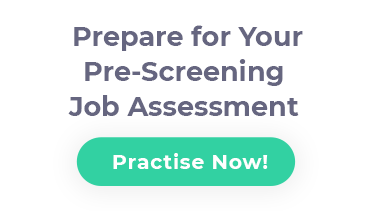FDM Group Assessment Centre, Aptitude Tests, Recruitment Process & Interviews Online Preparation – 2025

What Is FDM?
FDM Group is an IT and professional services company headquartered in London, United Kingdom. FDM invites graduates, ex-military and more to train with the company and when they have finished the students are offered a two-year contract as a consultant with a variety of companies, usually large financial institutions.
The company currently has almost four thousand employees and a few thousand graduates of the program. They currently have eleven training facilities across five continents. FDM has also received a variety of awards for being a top employer and hosting countless opportunities for job seekers.
What Is FDM’s Hiring Process?
FDM has a long, but simple hiring process. The end-goal of their recruitment process is to find people who are adaptable and eager to learn. FDM’s interview process typically takes two to four weeks depending on the location. There are four steps:
- Application
- Telephone/Video Interview
- Online Assessments
- Assessment Day
Application Process
FDM uses a straightforward application. While job history isn’t a major factor in their considerations, the company prefers work experience information to get a better idea of the candidate’s current skill set. The application takes about thirty to forty-five minutes to complete. In some instances, FDM will ask for a personalised cover letter or CV.
FDM Telephone/Video Interview
The second stage of the FDM interview process is an introductory interview held over the phone or through video chat. The outlet depends on what is available and convenient for the candidate.
This interview is brief, lasting about ten to thirty minutes at most. The candidate will participate in a walkthrough of their resume and be asked a handful of competency-based questions. Candidates should do background research on FDM and their program as well as have answers to questions such as:
- Why are you interested in FDM?
- Where do you see yourself in a year? 5 years?
- What attracted you to IT?
These questions determine a pathway for the applicant in FDM’s program.
FDM Online Assessments
The online assessments are evaluated before invitations to the assessment day are extended. If the scores are satisfactory, candidates will proceed to the next stage. The assessments are usually sent together via email and FDM asks that they are completed within two to five days.
The subject matter of the assessments is dependent on the position and the location. Candidates will most likely see one or more of the following tests during this stage of the FMD hiring process:
- General Aptitude Test
The general aptitude test consists of four main sections: situational judgment, verbal reasoning, knowledge of IT, and logical reasoning. The assessment is an hour long and has fifty questions. The IT questions relate to rudimentary concepts such as terminology, operating systems, programming languages, and the essentials of programming. The situational judgment questions are more geared toward the candidate’s emotional intelligence. These questions lay out a scenario and provide a response to the said scenario; it is the candidate’s job to rate the response on how well it handled the situation. The verbal reasoning questions evaluate the grammar, vocabulary and reading comprehension skills of the candidate. Finally, the logical reasoning section contains non-verbal questions that use shape sequences to assess the ability to identify patterns using logic. Each question is multiple-choice.
- Math Test (Numerical Test)
The math test will be the first assessment candidates encounter. The test taker is given a fifteen-minute time limit to answer twenty-one questions and is not permitted to use a calculator. The questions mainly concern arithmetic problems that require the use of the four basic mathematical operations (subtraction, addition, multiplication, division). The problems will ask for the test taker to calculate fractions, percentages, conversions, ratios and a variety of other similar concepts. It is recommended to brush up on Pythagoras’ theorem, fundamental algebra and math skills, and long division.
- Basic Computer Concepts
The basic computer concepts cover the fundamentals of a computer’s hardware, the different components, and other areas of computer literacy. The objective of the assessment is to see where the candidate is in terms of their knowledge of how a computer works. The results serve as the base from which FDM must work build and grow that knowledge. FDM does require a certain score, however, because they want their trainees to be on the same page during their training.
- Set Notation
The set notation test includes questions concerning Venn diagrams and probability. The test is an hour long. FDM provides a booklet of instructions for the candidate to work off of. Before the test, candidates should refresh their memory of 2 and 3 circle Venn diagram word problems and flow charts.
Assessment Centre (Assessment Day)
The assessment day is the final stage of FDM’s hiring process. The candidate is asked to come to one of the company’s main offices for a few hours to participate in a series of activities. These include assessments and interviews.
In some cases, candidates are asked to retake the assessments they previously took online. This ensures that the results are genuine. That being said, the tests initially taken will be the same ones seen at the assessment centre.
Candidates can expect two to three interviews throughout the day. One or two of the interviews is with a manager and the other is with a trainer. The bulk of the questions are competency-based with inquiries such as how the candidate’s skills are an asset to FDM, how the candidate aligns with the company values and examples of past behaviour that predict future success with FDM and the subsequent contract.
Each interview lasts about two to six minutes and the three are typically back-to-back. Candidates will hear back about their performance in the following week.
How to Prepare for FDM’s Online Assessments?
The simplest and most efficient way to prepare for online assessments is to use practice tests. Practice tests acquaint you with the content of the test and help you improve your accuracy. You also get the chance to practice the problems with the time limit so you can gain an idea of the pace you need to work at.
The most attractive benefit of the practice tests, however, is the ability to see your score. Your scores on these practice tests hint at a few important things. One of them is that this practice score serves as an estimate of how well you will do on the genuine FDM assessments. Another significant piece of information offered by the practice score is it will help you map out how much more preparing and practising you need to do for the tests.
If you find the practice tests too difficult or perhaps you just need a little refresher of the material, sample questions are the way to go. You can use sample questions a few minutes before the tests or the assessment day as a warm-up or you can use them just for the extra practice. Either way, the sample questions are great for focusing on your problem-solving approach and improving your accuracy.
Tips for FDM’s Assessment Centre & Interviews
The assessment centre interviews can be broken down into three categories: 1) the company and the IT industry, 2) education and work experience, 3) personal and professional motivations. Now that these areas have been sectioned off, you can focus on the questions independently of one another.
First off, FDM and information technology. This is where the bulk of the technical and job-specific questions will be. This may include problem-solving or working through hypothetical, but common day-to-day issues one may face in that industry. Before your interview, research current trends in the IT industry and do plenty of background research on FDM. Common questions during this interview include:
- What are the most important issues currently facing the IT industry?
- Why are you interested in FDM?
- What do you know about FDM?
Second, is the education and job history interview. During this interview, FDM tries to assess your current skill set to see how it could be useful to your future and the company. The questions are usually along the lines of “what did you learn from (past job) and how does it apply to the path you are seeking training in?”. Other common questions include:
- Describe a time you disagreed with a coworker. How did you handle it?
- What would you change about your degree?
- Why did you choose your degree?
Finally, the personal and professional interview. The questions are almost exclusively competency-based. This is considered to be the most difficult interview because the questions are very ambiguous. The most popular questions FDM asks are:
- Where do you see yourself in five years?
- Would you sacrifice quality to meet a deadline?
- Do you consider a change to be a good thing?
- How do you align with FDM’s values?
Spend some time coming up with thoughtful answers to these questions. Because you only have a short time with each interviewer, it is important to have an answer in mind, so you aren’t wasting valuable time trying to think of one on the spot.
Lastly, try to, at least distantly, associate your answers with FDM’s values. There are multiple questions, both obvious and implicit, that probe at how well you fit their values. Below are FDM’s values. Use these as a reference when answering the interview questions and try to work them into your answers as much as possible. For example, the question about your five-year plan is the perfect time to demonstrate your ambition and possibly growth. Another good example is when FDM asks about disagreements with coworkers you could try to work in your desire to be inclusive and handle conflicts with positive energy.
- Ambition
- Collaboration
- Energy
- Growth
- Inclusivity
- Professionalism
At the end of the day, FDM is simply looking for people who have a strong desire to learn. If this sounds like you, then FDM is your perfect match. Best of luck!

